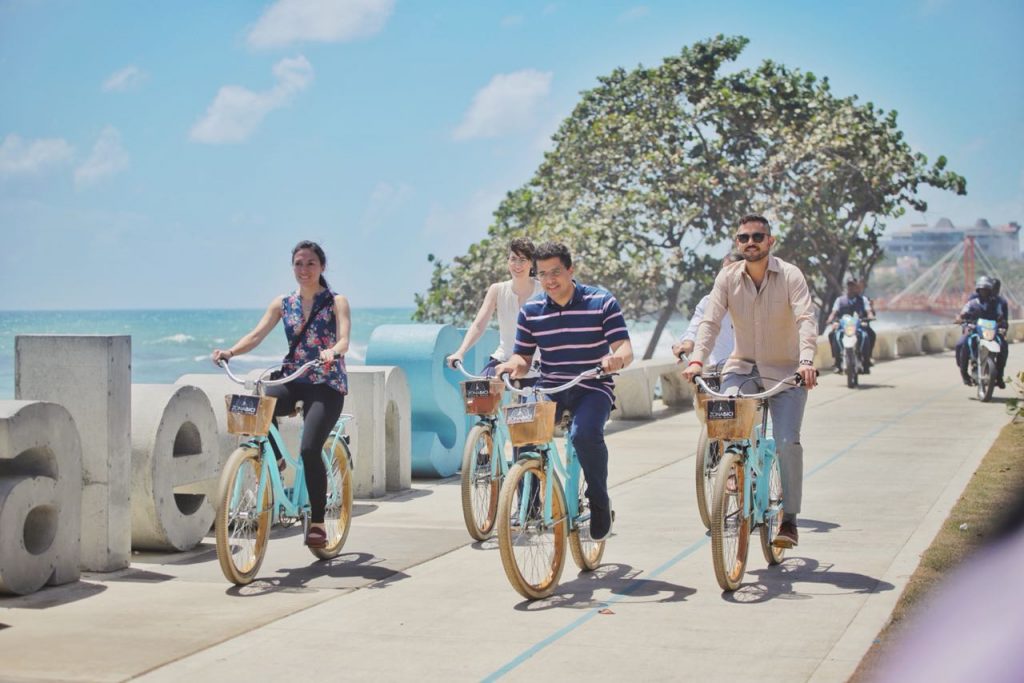According to the World Health Organization (WHO), insufficient physical activity is one of the leading risk factors for death worldwide. One in four adults is not active enough, increasing their risk for noncommunicable diseases (NCDs) such as cardiovascular disease, diabetes and cancer. On World Day of Physical Activity, Vital Strategies applauds the 12 cities in the Partnership for Healthy Cities network working to promote physical activity in the fight against NCDs by creating walkable and bikeable city streets.
Recent updates from three cities in particular—Fortaleza, Brazil, Melbourne, Australia, and Santo Domingo, Dominican Republic—show genuine progress is underway. All three are working on interventions aimed at directly improving the health of their citizens: Fortaleza and Melbourne through high-tech solutions for making exercise more accessible and sustainable, and Santo Domingo through road design.

The Brazilian city of Fortaleza opened six docking stations for its Partnership for Healthy Cities bike sharing system as well as launching a mobile application that allows use of the bikes for free.
Fortaleza’s corporate bike sharing system is aimed at encouraging safe, efficient physical activity among city employees. The city recently opened six pilot “dockless” stations in the City Hall area (pictured) and launched a mobile application for using the system—for free. The city will measure the health benefits to cyclists using the system, in hopes of encouraging private companies to implement their own bike shares. The city’s Partnership initiative also includes the redesign of four city intersections where bicycle crashes are especially common. Fortaleza is also part of the Bloomberg Philanthropies Initiative for Global Road Safety (BIGRS).
Last month, Melbourne launched a “Get Moving” rewards app to encourage its workforce to be more active by meeting fitness challenges, such as walking 5,000 steps every day. App users that meet the challenges accumulate points and can win prizes. Hundreds signed up in the first weeks of the program. The city hopes the app will get people moving more during their work days and also encourage them to consider commuting by bicycle or on foot.

Melbourne’s new Get Moving rewards app encourages users to meet challenges such as walking 5,000 steps or answering questions about their level of physical activity.
And finally, experts from World Resources Institute (WRI) recently visited Santo Domingo to help finalize the technical details for the city’s Partnership intervention. The city aims to promote physical activity and reduce traffic congestion through development of a citywide Bicycle Action Plan. The Plan will improve existing bike lanes and better connect coastal lanes to the rest of the city, using a combination of temporary and permanent physical adjustments. The idea is to make it easier and safer for residents of the city to bike to work and for recreation, in hopes of both improving their health and encouraging them to use cars less.

Santo Domingo Mayor David Collado (in stripes) joined city officials and technical experts from the World Resources Institute (WRI) in one of the areas targeted by city’s walkable/bikeable Partnership initiative.
In addition to increasing physical activity, walkable and bikeable interventions offer road safety and environmental protections for city dwellers. Efficient street designs and improved signage reduce injuries and deaths caused by cars, while bike lanes, pedestrian walkways and public transportation take up less room than cars, pollute the air less, and are more sustainable for cities in the longer term as well. With the majority of the world’s population now living in cities, walkable and bikeable streets offer a myriad of benefits for cities and the people who live in them.
Other Partnership cities with walkable/bikeable initiatives include:
- Boston, USA
- Barcelona, Spain
- Dhaka, Bangladesh
- Guadalajara, México
- Kingston, Jamaica
- Kyiv, Ukraine
- Montreal, Canada
- Santiago, Chile
- São Paulo, Brazil
The Partnership for Healthy Cities is led by former New York City Mayor Michael Bloomberg in his role as World Health Organization Ambassador for Noncommunicable Diseases (NCDs). The Partnership was borne out of the conviction that cities are the engines of change: Cities are uniquely positioned to transform the fight against injuries and NCDs diseases by implementing proven policies that significantly reduce exposure to risk factors.
The Partnership is supported by Bloomberg Philanthropies, in partnership with the World Health Organization and Vital Strategies.